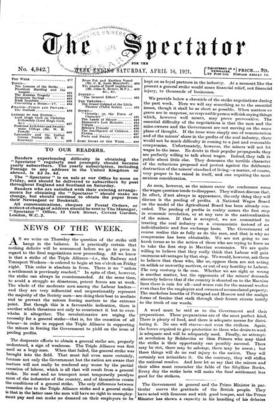As soon, however, as the miners enter the conference room
the wages question tends to disappear. They will not discuss that. In effect, if not always in appearance, the only thing they will discuss is the pooling of profits. A National Wages Board on the model of the Agricultural Board has been already con- ceded. The pooling of profits in reality means the first step in economic revolution, or at any rate in the nationalization of the mines. If that is accepted, we are committed to treating the coal industry on a communistic instead of an individualistic and free exchange basis. The Government of course realize this as fully as do the men, and that is why no compromise has been obtainable. We are not going to use harsh terms as to the action of those who are trying to force us to take the first step in Marxian economics. We are quite willing to believe that they really think that Labour will gain enormous advantages by that step. We would, however, ask them to believe that those who, like us, oppose them are not acting on selfish or unworthy motives, or out of any hostility to Labour. The very contrary is the case. Whether we are right or wrong is another matter, but the opponents of the miners' demands sincerely believe that if the country is shunted on to the Marxian lines there is ruin for all—and worse ruin for the manual worker even than for the employers and owners of accumulated property. The smokeless hearths of Petrograd and Moscow and the malign forms of famine that stalk through their frozen streets testify to the truth of our words.


































